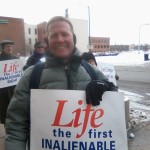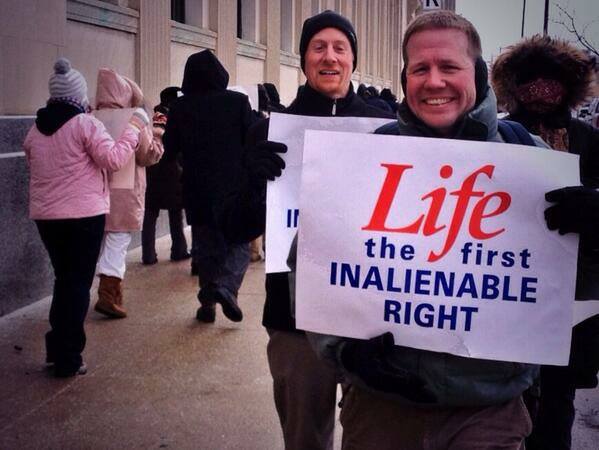 While most of us were thinking about the March for Life in Washington DC, or perhaps of the upcoming Marches in the UK and Paris, the St. Joseph’s Right to Life society organized a March for Life right here in South Bend. The South Bend demonstration was conducted from 12pm-1pm on Wednesday, January 22nd in front of the Courthouse at 204 S. Main Street in Downtown South Bend. During the hour long march, I conducted twelve approximately five minute interviews with march participants.
While most of us were thinking about the March for Life in Washington DC, or perhaps of the upcoming Marches in the UK and Paris, the St. Joseph’s Right to Life society organized a March for Life right here in South Bend. The South Bend demonstration was conducted from 12pm-1pm on Wednesday, January 22nd in front of the Courthouse at 204 S. Main Street in Downtown South Bend. During the hour long march, I conducted twelve approximately five minute interviews with march participants.
Respondents were usually warm, open, and dedicated to the defense of the sanctity of human life. Based on my interviews, the crowd appeared to be predominantly Catholic including two adult converts and a revert among those I interviewed. All respondents belonged to church communities. One of my twelve respondents is a member of the Assembly of God who thought he might be best described as a Pentecostal, another is nondenominational.
Most of the marchers were retirement age, or younger mothers with school age children often in tow and the presence of children brought a joyous element to the event. The time of day of the march probably accounted in large part for the demographics of the crowd. Men and women were about equally represented and many have been involved with pro-life activities for more than a decade. Several have been involved since the Roe v. Wade decision in 1973. One married couple recounted that they had been shocked when the decision passed in 1973. They “couldn’t believe” that their country was capable of legalizing violence against children.
Interestingly, a number of respondents come from large families – one remarked that he had eleven siblings – they have many children themselves and often have adopted children or grandchildren. Participants in the march thus seem to practice what they preach regarding their love of life.
Interviewees said that they were drawn to the pro-life movement by one or both of their parents’ commitments to pro-life issues during respondents’ childhoods, a sense of Jesus or Mary tugging at their hearts about the problem of abortion, Catholic media sources such as EWTN and local stations, or a sermon they’d heard. One marcher recited a question that had been asked in a sermon he had heard many years ago that motivated him to get involved. “Who is more defenseless than an unborn child?” Each person said they’d sought out the Right to Life society independently or with their spouse in response to childhood formation or what they experienced as a a spiritual call to work in the pro-life movement.
Every respondent said that their pro-life conviction had grown stronger since they’d become involved with pro-life activities.
Two respondents seemed to become somewhat defensive when I said in my introductory request for an interview that I was associated with Notre Dame. One promptly reported, “I was arrested on the campus of Notre Dame in 2009 for opposing the invitation to Obama to speak.” She also said that Notre Dame is confusing students by inviting speakers that support abortion. Another eyed me suspiciously when I mentioned an affiliation with the university, “What are you trying to do?” she asked. But she gave the interview and relaxed as we talked.
The March was small but it seems to have been a success in as much as it brought people together in common support of life, encouraged them in their fervor, and was visible to the public. Visibility could have been greater, but the sense of community and encouragement at the march was strong.


Isis,
Ziad Munson, a sociologist, makes some very counter-intuitive claims about pro-life mobilization in his book: The Making of Pro-life Activists: How Social Movement Mobilization Works
Here is part of a summary on Amazon.com:
“Through extensive interviews and detailed studies of pro-life organizations across the nation, Munson makes the startling discovery that many activists join up before they develop strong beliefs about abortion—in fact, some are even pro-choice prior to their mobilization. Therefore, Munson concludes, commitment to an issue is often a consequence rather than a cause of activism.”
I’m not sure Munson is right (and it does not seem to fit with what you found here) but he compiles an array of data supporting his contention in this book. At the very least, his book forces us to reconsider our assumptions about mobilization into social movements and to look anew at the social world around us.
Great post,
Brian
P.S. Here is a link to Munson’s book: http://www.amazon.com/The-Making-Pro-life-Activists-Mobilization/dp/0226551202
Thanks, Brian.
I just made an interlibrary request for Munson’s book. I wonder what accounts for the findings at the South Bend March being so different from what he would lead us to expect.
Interesting post. I noticed those same demographics when I attended one of the Fortnight for Freedom rallies in South Bend. I had expected to see lots of retirement age people given the time of the event, but there were also lots of young mothers with children there as well.